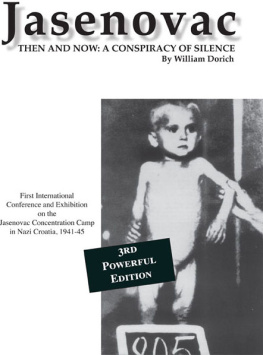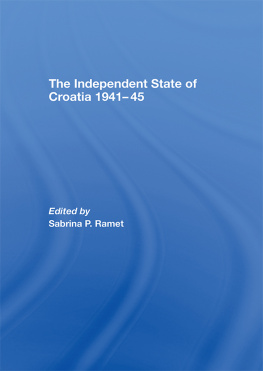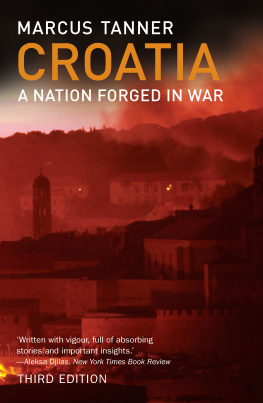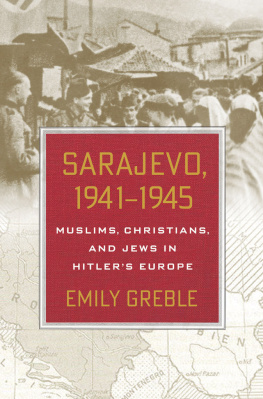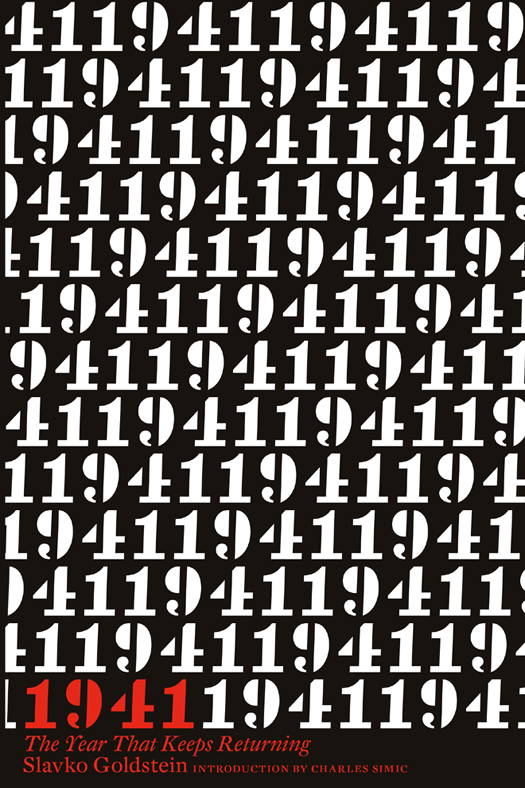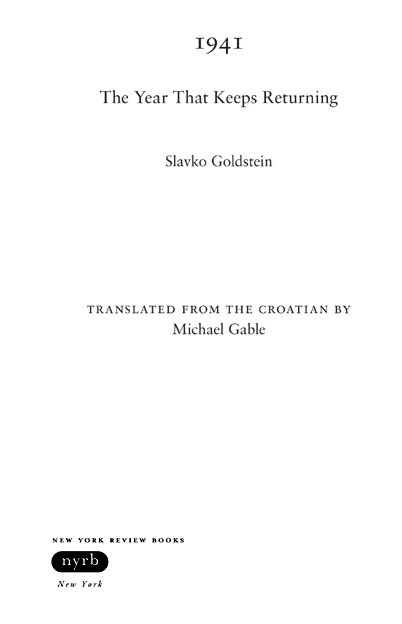THIS IS A NEW YORK REVIEW BOOK
PUBLISHED BY THE NEW YORK REVIEW OF BOOKS
1941
THE YEAR THAT KEEPS RETURNING
Copyright 2007, 2012, 2013 by Slavko Goldstein
Copyright 2009, 2013 by Charles Simic
An earlier version of the introduction by Charles Simic was first published as He Understood Evil in the July 2, 2009 issue of The New York Review of Books (Volume 56, Number 11).
All rights reserved, which includes the right to reproduce this book or portions thereof in any form whatsoever.
Published by The New York Review of Books, 435 Hudson Street, Suite 300, New York NY 10014
www.nyrb.com
Goldstein, Slavko.
[1941. English]
1941 : the year that keeps returning / by Slavko Goldstein; translated by Michael Gable; introduction by Charles Simic.
pages cm. (New York Review Books classics)
Originally published as: 1941 : godina koja se vraca. Zagreb : Novi Liber, 2007.
Includes bibliographical references.
ISBN 978-1-59017-673-3 (alk. paper)
1. Goldstein, Slavko. 2. JewsCroatiaBiography. 3. CroatiaHistory1918-1945. 4. Vujicic, Milan, -1941Assassination. 5. Ustaa, hrvatska revolucionarna organizacija. 6. World War, 1939-1945CroatiaKarlovac (Karlovac) 7. Karlovac (Karlovac, Croatia)History20th century. I. Title.
DS135.C75G65413 2013
949.72022dc23
2013011176
Cover design: Rumors
Author photo: Copyright Ratko Mavar
ebook ISBN: 978-1-59017-700-6
For a complete list of books in the NYRB Classics series, visit www.nyrb.com or write to:
Catalog Requests, NYRB, 435 Hudson Street, New York, NY 10014
v3.1
Contents
Introduction
I CAME ACROSS this remarkable book, which had not yet been translated into English, while writing about the wars in former Yugoslavia in the 1990s. It deserves attention, because it explains, perhaps better than any book I know of, how different ethnic groups, who lived side by side in peace, were made to turn against one another and become each others executioners in that unhappy country. Written by the distinguished Croatian journalist and publisher Slavko Goldstein, whose father was killed by the Ustashas, the pro-fascist nationalists who were brought to power in Croatia by the Nazis when they occupied Yugoslavia in 1941, the book is a memoir of that fateful year, a meticulous historical recreation, and the cautionary account of the events that led to the deaths of some 32,000 Jews, 40,000 Gypsies, and 350,000 Serbs between 1941 and 1945.
The great instrument of moral good is the imagination, Shelley wrote in A Defense of Poetry. Unlike many intellectuals who tend to rationalize and minimize the disagreeable chapters in their nations history, Goldstein not only wishes to tell the truth, but to put himself in the shoes of various victims and even a few of their executioners. That makes 1941 a most unusual book, a story of one familys tragedy that is also a careful work of history that, because of its interest in a large number of individuals and their parallel stories, often reads like a novel.
The tale Goldstein tells starts in April 1941, after an uprising on March 27 in Belgrade led to a military coup. The army overthrew the Yugoslav coalition government that had been forced to join the Tripartite Pact with the Axis powers two days earlier; and the new government, consisting of Serbian officers, aware that the Nazis were making preparations to invade the country, tried to make itself more representative by also including some Croatian politicians. It was too late. Hitler declared that the uprising in Yugoslavia had drastically changed the entire political situation. Originally, he wanted to leave Yugoslavia alone, so that he could attack Russia. Now, he said, Yugoslavia must be regarded as an enemy and dismembered as quickly as possible.
The Germans encouraged Italy, Hungary, and Bulgaria, which had long-standing claims on Yugoslav territory, to participate in the invasion by extending to them the opportunity of annexing the Adriatic coast, Banat, and Macedonia respectively. Likewise, a promise of political independence was extended to the Croats. Days later, on April 6, Yugoslavia was attacked by Germany without a declaration of war, Belgrade was bombed, and the country was quickly occupied and partitioned. Croatia proclaimed its independence on April 10 and German troops were greeted as liberators when they entered Zagreb, the Croatian capital. For the Croats, after more than eight centuries of subordination to other powers, having their own state for the first time was a happy occasion.
Goldstein, born in 1928, was thirteen years old and living with his father, mother, and younger brother in Karlovac, a beautiful old city situated some fifty miles southwest of Zagreb, where his father owned a bookstore known as a meeting place of socialists, Communists, liberals, union workers, and other antifascists. There they bought, or borrowed from a lending library, books by such progressive writers as Gorky, Dos Passos, Upton Sinclair, Jack London, Thomas Mann, and Berthold Brecht. Goldstein recalls the day his childhood ended. On April 13, Catholic Easter, with the city already occupied by the Nazis, he recalls telling his father that he was going out to play with a friend. The father seemed surprised. There were German tanks and soldiers in the streets. After a bit of wavering, he gave his permission.
When the son came home for lunch, his father was gone, never to return again. He was rounded up with some twenty other well-known local Serbs, Communists, and Yugoslav sympathizers, the very day the future leader of the Independent State of Croatia, Ante Paveli, returned from exile in Italy and passed through Karlovac on his way to Zagreb with two hundred Ustasha immigrants in Italian uniforms, many of whom had been interned for six years in various camps in Sicily, Sardinia, and the Lipari islands, and who were on their way to serve as the ruling elite of the new Nazi puppet state.
Most of the men arrested with Goldsteins father were soon released, but for reasons that are not clear to this day, he was kept in custody with a few other unreliables, most likely because he was a known leftist. The new regime at the time didnt yet have a clear Jewish policy. The main enemies of the Ustasha movement were the Serbs and the Belgrade regime. Furthermore, some of the nationalist leaders of the earlier generation in Croatia, the so-called Frankists, were Jewish. It was only in the 1930s, under the influence of Hitlers ideas, that the Ustasha ideology, a blend of fascist and Nazi doctrines, became more and more anti-Semitic. Of course, anyone who was Jewish and had seen what had happened in Germany had to be worried.
What they did not know, and could not possibly imagine, is that it would be the local nationalists, rather than the Nazis, who would be their executioners. So they waited, expecting that the state would not harm peaceful citizens. This was true of local Serbs too. Not many of them were aware that Dr. Mladen Lorkovi, one of the future Ustasha ministers, had said that the Croatian state cannot exist if 1,800,000 Serbs live in it, if at the same time we have a strong Serbian state behind our backs. We, therefore, must strive to make the Serbs vanish from our midst. Supposedly, even Himmler was horrified when he heard from one of Pavelis emissaries in 1941 that they intended to kill two million Serbs.
The most disheartening aspect of the early chapters of Goldsteins book is how long it takes for future victims under such a regime to realize that they are doomed, and how quickly others, who may have barely given them a thought a week before, become their eager persecutors. Since many of those in Karlovac who participated in the atrocities were either Goldsteins neighbors, school friends, or known to him as prominent citizens, hes able to tell us in considerable detail how they behaved during and after the war. Its a story made even more amazing by its close resemblance to the events in Croatia and Bosnia not long ago. A plan concocted by a small group of extreme nationalist intellectuals to undo the ethnic and religious mix of the population, which the wars with the Ottoman Empire and expulsions of peoples over the centuries had produced, was swiftly enacted. One day you were a citizen of Yugoslavia with full rights, and the next day you were told that unless you were a member of the Croatian nation by origin and blood, you did not exist legally. When it comes to this kind of evil, most human beings are innocents. Who can possibly believe that the prospect of having complete power over someone who has none would be such an enticement to people from all walks of life? Who can accept the idea that their school friends will turn into killers the first chance they get?




